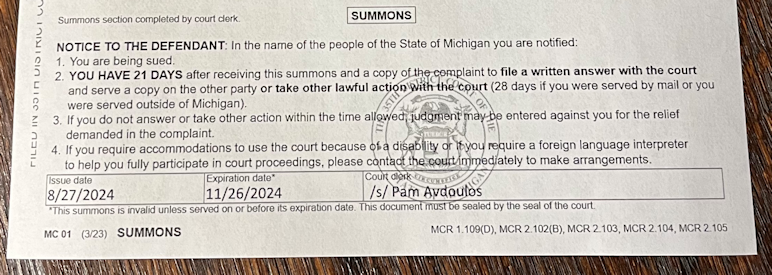How to contest a forfeiture case in Wayne County Michigan
Civil Litigation versus Criminal Defense
Civil asset forfeiture cases are civil cases as opposed to criminal. Forfeiture cases might be closely linked to criminal charges, but the rules and procedures are very different. If you have ever been sued (or even divorced), you already have experience with civil litigation. But forfeiture cases are very strange civil cases, and they are routinely handled by lawyers who do not regularly practice in the civil arena.
A typical civil case begins when a private party decides to bring a lawsuit against another person. The party initiating the lawsuit is the "plaintiff" while the party getting sued is the "defendant." These might be two neighbors with a property dispute, a bank attempting to collect an unpaid loan from a debtor, or multiple publicly traded corporations suing each other for billions of dollars. Unlike any of these typical civil cases, a civil asset forfeiture case might require you to do something before you get sued, and if you don't take the appropriate steps, the police and prosecutor's office win without ever having filed a lawsuit!
Your Property Is Being Sued
Nearly every civil case begins with a summons and complaint. The stock SCAO summons begins by stating, "NOTICE TO THE DEFENDANT: In the name of the people of the State of Michigan you are notified: 1. You are being sued." But "you" are not being sued. Instead, your property is being sued. Your name may not appear anywhere on the summons and complaint.
A typical case caption in a civil asset forfeiture case is titled, "People v Twenty Three Thousand & Sixty Dollars in US Currency," and the unusual nature of these civil cases does not stop there. First-year law students learn that a court must have both subject matter jurisdiction as well as personal jurisdiction before it has the power and authority to act. But in People v Twenty Three Thousand & Sixty Dollars in US Currency, the trial court held that personal jurisdiction over the individual was unnecessary. The Court of Appeals affirmed holding, "the trial court correctly ruled that it did not need personal jurisdiction over the claimant. Because forfeiture proceedings are in rem proceedings, it is possession of the subject matter of the action that brings the res within the reach of legal process."
Michigan Court Rule 2.203 Joinder of Claims, Counterclaims, and Cross-Claims
After a forfeiture complaint has been filed and served, you must answer the complaint to defend your interest in the property. In civil litigation, it is not unusual for a defendant to file a counterclaim. A counterclaim is a lawsuit brought against the plaintiff. Under MCR 2.203, "[a] counterclaim or cross-claim must be filed with the answer." Thus, it is very common to see lawsuits that require deciphering, as ABC Corp. is labeled "Plaintiff/Counter-Defendant" while 123 LLC is the "Defendant/Counter-Plaintiff." Add in cross-complaints and third-party complaints, and the captions tell a story.
A counterclaim is almost never filed in an asset forfeiture case. Some online resources state that, "[I]n a civil asset forfeiture case, a 'counterclaim' is a legal claim filed by the property owner (considered the 'claimant') against the government, essentially alleging that the government's attempt to seize the property is improper or unlawful." This rarely ever happens, and the vast majority of federal courts that have addressed whether a counterclaim may be filed in a forfeiture case have summarily dismissed property owners’ counterclaims in civil forfeiture actions. But see, Hallock, Nicholas (2021) "Removing Interpretative Barnacles: Counterclaims and Civil Forfeiture," University of Chicago Law Review: Vol. 88: Iss. 4, Article 4. ("The civil forfeiture counterclaim finds strong support in the Civil Rules’ text, as well as in their historical context, purpose, and original public understanding. In the words of then-Judge Charles E. Clark, the principal drafter of the Civil Rules, courts should remove the “interpretative barnacles” that have made it unnecessarily difficult for property owners to defend themselves in civil forfeiture actions.")
Discovery: Interrogatories, Request for Production of Documents, and Depositions
The discovery process requires each party to disclose their evidence to the other party. This might sound simple on the surface, but discovery is one of the most complex areas of civil litigation. It can be tedious, expensive, and time-consuming.
Your typical Wayne County Assistant Prosecutor handling a civil asset forfeiture case is a prosecutor experienced in criminal law, but they usually lack any real or meaningful civil litigation experience. The civil complaints that they file are unusual, and by the time that civil discovery gets underway, things get weird.
Seasoned civil litigation attorneys will immediately understand that a typical prosecutor does not understand the discovery rules, and this can be extremely frustrating because a singular judge normally presides over all civil asset forfeiture cases in the Detroit area. Prosecutors are frequently given a pass on discovery violations, and bizarre objections that might result in sanctions against a party in business litigation will land on deaf ears in forfeiture cases.
Discovery: Fifth Amendment and Miranda Issues
While prosecutors might get a pass on discovery violations, the claimant in a civil asset forfeiture case needs to act with caution. You may be required to provide access to bank records or respond to written questions regarding your income. You may be asked questions at a deposition while you are a target or subject of a parallel criminal investigation or prosecution.
The Supreme Court's decision in Miranda v. Arizona established procedural safeguards to protect individuals' Fifth Amendment rights against self-incrimination during custodial police interrogations, due to the coercive nature of such situations. However, these safeguards are not required in civil depositions, such as those in civil forfeiture proceedings, because the coercive conditions of custody and interrogation are absent. As a result, statements made during civil depositions, even if self-incriminating, are admissible without Miranda warnings, as affirmed in United States v. Solano-Godines.
The Good News
Despite the potential pitfalls that might prove to be challenging in civil asset forfeiture cases, you may be able to negotiate a favorable resolution. Prosecutors know that a dedicated civil asset forfeiture attorney can attack every aspect of their case, and evidence may come to light that exposes nefarious schemes by police to generate profits. In many instances, civil asset forfeiture cases lack any credible evidence supporting forfeiture, and prosecutors are eager to resolve cases that might prove to be embarrassing. After decades of abusive forfeiture policies turned public opinion against policing for profit, state lawmakers have also intervened to help victims of unjustified civil asset forfeiture seizures by passing laws that try to level the playing field.






